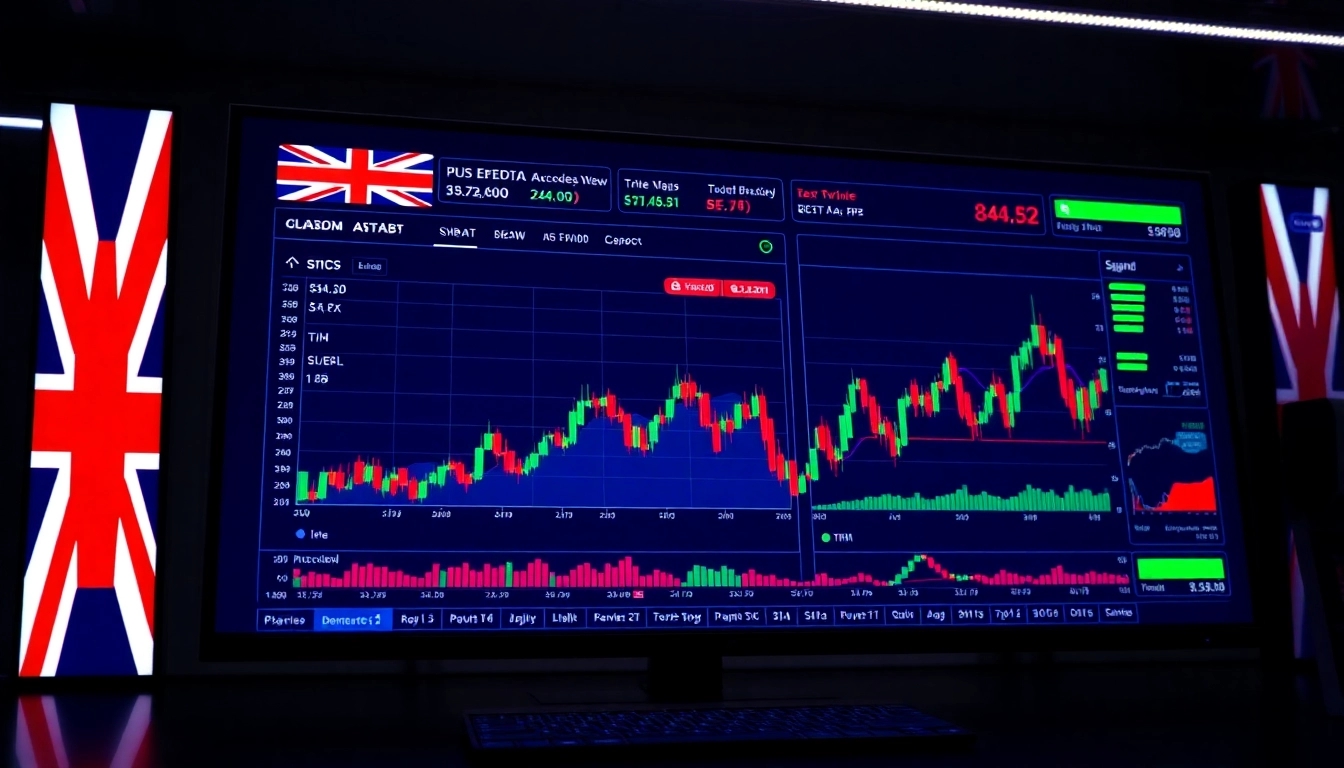
Understanding the Current UK Commodities Market Dynamics
The UK commodities landscape continues to be shaped by a confluence of global economic indicators, geopolitical developments, and regional policies. Recent data shows that commodity prices, notably gold and oil, have experienced significant fluctuations, driven by both international and domestic factors. For instance, gold hit a new record high of $3,501.59 per ounce, surpassing previous peaks, reflecting investor hedging amidst economic uncertainty. Meanwhile, crude oil prices have experienced a slight decline but remain poised for weekly gains, highlighting ongoing supply concerns and geopolitical tensions affecting energy markets.
To stay informed, investors and traders are increasingly turning to trusted sources like UK Commodities Investment News for real-time insights, analysis, and strategic guidance. This resource provides comprehensive coverage of price movements, market drivers, and actionable strategies tailored for the UK market context.
Overview of Commodity Price Movements in the UK
Recent movements illustrate a mixed picture with gold breaking records, reaching above $3,500 an ounce, and oil prices dipping modestly. Gold’s rally is predominantly attributed to US inflation concerns and safe-haven demand, while oil prices are affected by fluctuating US adviser’s comments and geopolitical factors involving Russia and OPEC nations. European markets reflected these shifts with the pan-European STOXX 600 closing marginally higher, up 0.17% at 551.07, driven by resilience in defense stocks amid global uncertainties.
Factors Influencing Gold and Oil Prices This Quarter
Gold’s surge is linked to US inflation data and fears of recession, prompting investors to seek safe-haven assets. Conversely, oil’s pricing has been influenced by US-Sino trade tensions, US diplomatic comments, and OPEC’s production adjustments. Recently, US adviser’s comments regarding monetary policy and China’s economic data have echoed across markets, contributing to oil’s volatility. Moreover, geopolitical tensions, such as US-Russia relations and crude import policies, notably impact UK commodity supplies, emphasizing the importance for investors to monitor international politics closely.
Impacts of Global Economic Trends on UK Commodities
The UK’s commodities prices do not operate in isolation. They are heavily affected by global economic trends such as US Federal Reserve rate decisions, China’s economic health, and European Union policies. For example, the prospect of US rate cuts has supported a rally in commodities like gold and copper, while inflationary pressures in the US elevate the appeal of precious metals. Additionally, China’s weak economic data has pushed iron ore futures lower, illustrating susceptibility to Chinese manufacturing output and infrastructure investments — both critical for the UK’s import-dependent commodity markets.
Strategies for Effective UK Commodities Investment
Top Techniques for Navigating Market Volatility
In volatile environments, diversification is paramount. Investors are advised to spread their holdings across different commodity classes—precious metals, energy, agricultural products, and green metals—reducing exposure to sector-specific risks. Employing technical analysis complemented by fundamental insights can enhance timing and decision-making. For example, monitoring trendlines such as the 200-week moving average for Bitcoin and other cryptocurrencies has historically provided signals for market shifts, reducing the risk of costly misjudgments.
Diversifying Your Portfolio with Commodities
Given current market uncertainties, diversifying with commodities can serve as a hedge against inflation and currency fluctuations. Allocating a percentage of your portfolio to assets like gold, which has historically preserved value during economic downturns, or renewable energy metals like lithium and cobalt, which have long-term growth potential, can optimize risk-adjusted returns. For instance, London’s reinsurance brokers are increasingly advising clients to integrate commodities linked to the green energy transition—such as rare earth elements—into their portfolios.
Analyzing Market Data to Make Informed Decisions
Data-driven decision-making remains central to successful commodities investing. Utilizing real-time market analytics, historical price trends, and geopolitical risk assessments can help anticipate future movements. Tools such as economic calendars, supply-demand forecasts, and sentiment analysis dashboards enable traders to identify early signals of price reversals or breakout scenarios. As markets remain intertwined, being adept at interpreting macroeconomic indicators—like US employment figures or Chinese manufacturing PMI—can significantly improve investment outcomes.
Regulatory and Policy Influences on UK Commodities
Recent Government Policies Affecting Commodities Trading
The UK government has implemented policies that influence commodities’ trading environment, notably regulatory changes for financial markets and environmental initiatives. Recent proposals for stricter environmental standards are encouraging investments in renewable energy and green metals, aligning economic incentives with climate commitments. For example, the UK’s commitment to net-zero emissions by 2050 creates a favorable regulatory framework for green commodities, attracting institutional investors globally.
Environmental Regulations and Their Market Impact
Environmental regulations, such as carbon pricing and emission reduction targets, directly impact commodities like coal and natural gas. Stricter standards decrease demand for fossil fuels, shifting investment toward cleaner alternatives such as hydrogen or sustainable metals. These evolving policies are also prompting technological innovations, fostering new market segments—an opportunity for investors to capitalize on the transition to greener economies.
Future Policy Outlook and Investment Implications
Anticipated policy shifts, including potential reforms in trade tariffs, import/export restrictions, and carbon regulation, can significantly alter supply chains and commodity prices. Keeping abreast of these changes allows investors to adjust strategies proactively. For instance, the UK’s possible incentives for domestic critical mineral extraction could boost investment in mining stocks and green metals, providing long-term growth avenues amid global supply constraints.
Emerging Trends and Opportunities in UK Commodities
Renewable Energy and Green Metals Investment Potential
The transition to renewable energy sources presents substantial opportunities. As the UK accelerates its clean energy initiatives, demand for metals like lithium, copper, and cobalt is expected to rise sharply. Companies involved in sustainable mining, recycling, and innovative energy storage solutions are poised for growth. Capitalizing on these trends requires close monitoring of technological advancements and policy incentives that could influence supply and demand dynamics.
Technological Innovations Changing Commodity Markets
Emerging technologies such as AI-powered R&D, blockchain for supply chain transparency, and advanced extraction methods are revolutionizing commodity markets. For example, AI tools can forecast price cycles more accurately, helping investors make timely decisions. Similarly, blockchain can enhance traceability and reduce fraud, increasing market confidence and efficiency. These innovations are setting the stage for smarter, more resilient trading strategies.
Forecasting Future Price Movements and Market Cycles
Market cycles tend to repeat, influenced by macroeconomic patterns, geopolitical events, and technological shifts. Historical data indicates that commodities like gold perform well during economic slowdowns, while energy prices often respond to OPEC and geopolitical tensions. Strategic forecasting involves analyzing technical indicators, macroeconomic fundamentals, and geopolitical risks. For instance, tracking the 200-week trendline on cryptocurrencies can serve as a guide for bullish or bearish momentum shifts, enabling investors to position accordingly.
Case Studies and Expert Insights on UK Commodities Investment
Successful Investment Strategies from Industry Leaders
Leading investors emphasize disciplined diversification, rigorous market analysis, and staying alert to geopolitical developments. For example, microstrategy’s Bitcoin accumulation strategy showcased how institutional adoption and macroeconomic concerns can drive digital gold prices higher. Similarly, top hedge funds leverage AI-driven analytics and moment-to-moment market data to optimize their commodity trades, reducing exposure to sudden shocks.
Analyzing Recent Market Fluctuations and Outcomes
Recent market reactions have illustrated the importance of proactive risk management. For example, geopolitical tensions between the US and Russia prompted oil price swings, underscoring the need for hedging strategies. Tracking market sentiment, economic data releases, and regulatory interventions can help traders navigate such turbulence more effectively. A comprehensive approach combining technical and fundamental analysis provides a competitive edge.
Tools and Resources for Staying Ahead in Commodities Trading
Today’s traders benefit from sophisticated tools—real-time news feeds, AI-powered predictive models, and global economic calendars. Platforms offering integrated analytics enable quick decision-making. Additionally, expert research reports and market webinars enhance understanding of emerging trends, helping traders identify opportunities and avoid pitfalls. Continuous education and access to cutting-edge data are crucial for sustained success in the dynamic UK commodities market.




